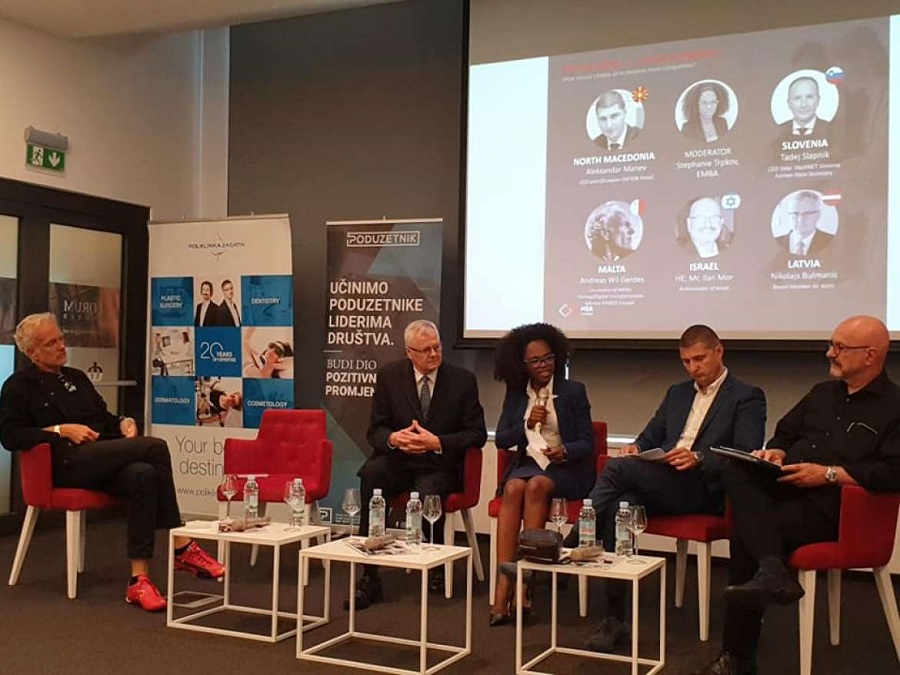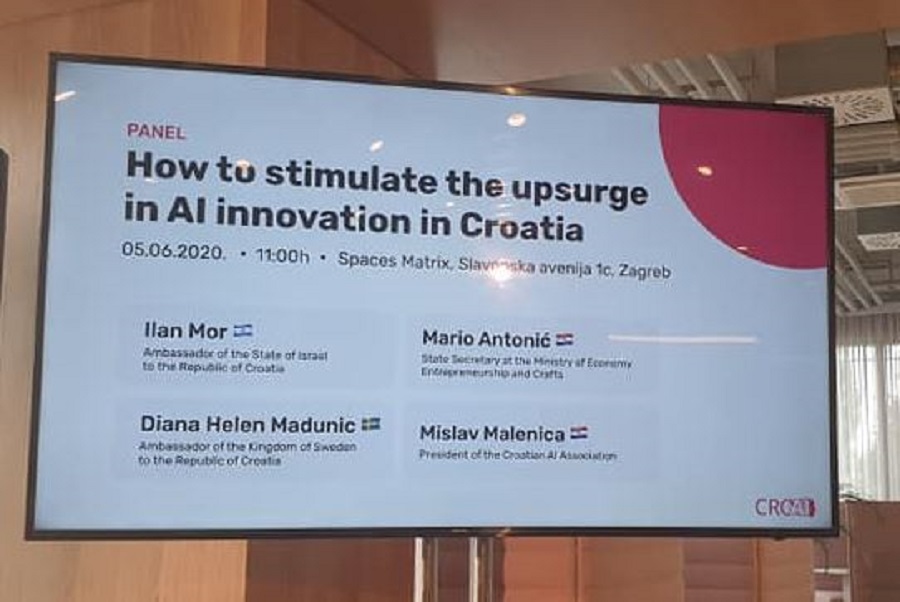What Happens When Israel, Sweden & Croatia Compare Notes on AI Strategy?
June 18, 2020 - Senior representatives from Croatia, Israel and Sweden gathered in Zagreb at a CroAI conference on the reaction to the EU white paper on AI strategy. There are few finer examples of the competence of the current Croatian administration.
Just over a year ago, MBA Croatia organised a Croatia 2.0 conference in Zagreb called How to Be Globally Competitive from Croatia. You can read a full account of the conference in Celebrating Croatian Global Excellence and Opportunity at 1st MBA Croatia Conference.

It was an excellent conference, full of stimulating ideas and experiences from other countries. Speakers and panelists came from Latvia, North Macedonia, Nigeria, Malta, as well as the Israeli Ambassador Ilan Mor, who gave a great account of how a small country not much bigger than Croatia managed to become almost self-sufficient, as well as one of the leading tech countries in the world - necessity is the mother of invention.
The organisers decided to stream the conference live and to make it available online, so that it could reach an international audience, who could learn about the considerable successes of private business in Croatia in the fields of IT and innovation.
But someone objected to the fact that the conference was in English. With just a few foreigners in the room, why could it not be in Croatian?
I did not recognise the person objecting (you can see the objection above), but knew it was some government official who was attending the conference.
It was only later that I learned that the person objecting was a Deputy Minister of the Economy. I was a little surprised, but then nothing really surprises me in Croatia these days. Until...
... last month when I was invited to a CroAI conference on the Croatia AI community's reaction to the recent EU white paper on AI strategy. I was hugely surprised to find not only that our English-shy deputy minister was the official government panelist next to the Swedish and Israeli ambassadors and the president of CroAI, but that he was actually leading the EU's AI efforts currently due to Croatia holding the EU Presidency.
I know very little about AI (but that is about to change), and it was fascinating to listen to the Swedish and Israeli ambassadors presenting their countries and AI efforts and successes. Israeli Ambassador Ilan Mor is a titan, and one of the most effective ambassadors in Zagreb currently. Proud of his country and passionate about his mission, I have heard him speak at several conferences in the last year or so, and my thoughts were echoed by two attendees at this CroAI conference afterwards:
"If only we had someone like Ilan pushing Croatia's agenda - what progress we could make."
After his impressive presentation, during which he said that Israel was lagging behind in AI research (third behind China and the US) and was planning to increase its current 4.9% of GDP spent on R&D, came the video. Check out what Israeli AI is giving the world.
Next up, Sweden, and another great presentation from the new Swedish ambassador, who I heard speak for the first time. She did very well, and had this outstanding video to showcase Swedish excellence. Sweden, too, is lagging behind. They too, plan on increasing their R&D budget from the current 3.6%.
And then came the Croatian 'presentation'.
There was no video. In fact, there was nothing of substance at all (you can see the entire conference below and judge for yourselves). And, the more the empty words continued, the more I looked around the room. Shining examples of excellence from Israel and Sweden yes, but SO many bright and talented young Croatian entrepreneurs doing outstanding things. All they are looking for - just like the medical tourism industry in Croatia - is for legislation and financial support. And then for the government to get out of the way and let them grow the industry and fill the government coffers with the revenues made.
I can't recall a situation where Croatia's weakness and poor leadership was so clearly shown, while its private sector looked so competent than at that CroAI conference. And I wondered indeed what might we achieve if someone like the Israeli ambassador was fighting their corner. I decided to ask the Deputy Minister some questions. You can see the exchange above.
My questions were:
What percentage of GDP does Croatia spend on R&D?
Does Croatia have a video like Israel and Sweden? If yes, can we see it? If no, why not?
Which official website do I visit to learn more about the government's AI strategy and progress reports?
You can watch the answers and judge for yourselves.
Only 13 sleeps until Germany takes control of the EU.
Are you interested in a better Croatia for your children? If you would like to get involved in creating Croatia 2.0, contact This email address is being protected from spambots. You need JavaScript enabled to view it. Subject AI conference. The CROMADS website goes live next month, but you can follow CROMADS on Facebook already.
CROMADS: Why You Should Move to Croatia, With or Without Uhljebistan
CroAI Sends Brussels Key Guidelines for Legislative Framework on AI
June the 7th, 2020 - The Croatian Association for Artificial Intelligence (CroAI) recently presented its guidelines for encouraging the development of artificial intelligence in Europe as a review of the European Commission's White Paper on Artificial Intelligence, which is in public discussion for another week.
In February this year, the European Commission sent a White Paper on Artificial Intelligence out for public discussion so that the interested public could comment on the document indicating what the European legislative framework for this new technology would look like. Throughout the White Paper, the message is that Europe sees the development of AI as an opportunity to become a global leader, but at the same time protect its citizens and their digital rights.
During the Croatian Presidency of the Council of the European Union, CroAI decided to offer its voice to the debate and as such, it proposed three guidelines that the CroAl association considers key to the development of a competitive AI industry in Europe:
1. Limited legislation for the earliest stage of AI innovation that would allow small players to develop their ideas in safe conditions but without the need to obtain a large number of permits.
2. Prevent the emigration of innovative start-ups outside of Europe through the development of a competitive EU-wide start-up framework.
3. The role of the state as the first client in encouraging the accelerated development of the AI industry
Under one of these measures are the five mechanisms for strengthening start-up communities which include simplifying the process of starting and closing start-up companies, creating a better investment climate, enabling the better sharing of business success with employees (ESOP plans, etc.), the reduction of administrative barriers and the strengthening of the single digital market of the European Union as the greatest trump cards of European economic integration.
CroAl's guidelines were presented as part of a panel discussion on "Stimulating the development of artificial intelligence in the Republic of Croatia - legislation, entrepreneurship and past experiences" attended by Ilan Mor, Ambassador of the State of Israel to Croatia, Diana Helen Madunic, Ambassador of the Kingdom of Sweden to Croatia, Mario Antonic, State Secretary of the Ministry of the Economy, Entrepreneurship and Crafts, and Mislav Malenica, President of the Croatian Association for Artificial Intelligence (CroAI).
On that occasion, the Ambassador of the State of Israel, Ilan Mor, pointed out that Israel is the third in the world, after the USA and China, in the number of start-up companies in the field of artificial intelligence, and added: academies and state institutions. He stated: ''A key ingredient in fostering and growing innovation is synergy between entrepreneurs, academia and government institutions. Without that, there is no progress.''
The Ambassador of the Kingdom of Sweden, Diana Helen Madunic, emphasised the importance of a strong industrial tradition in Sweden, which is a key accelerator of the demand for innovations in the field of artificial intelligence. "Croatia as a young country can take advantage of its membership of the European Union and place its innovations based on artificial intelligence om the European single market.''
State Secretary Antonic, who also the head of the working group for the development of the national plan on artificial intelligence at the Ministry of Economy, pointed out: "We're in the process of setting up an Innovation Centre located in Zagreb and it will be partly dedicated to the development of artificial intelligence."
The president of CroAI, Mislav Malenica, an entrepreneur and the director of Mindsmiths, believes that Croatia has a chance to become a leader in the application of artificial intelligence and could become a recognisable AI force in the world.''
For more on CroAI, follow Made in Croatia.



